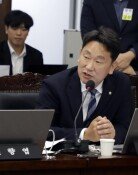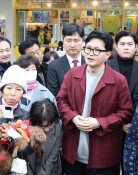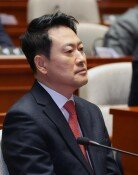Tasks for the new ministers

1. Ministry of Finance and Economy (MOFE)
To map out long-term reform plan for the harmony of restructuring and the economic recovery
MOFE Minister Jin Nyum did not hold a separate inaugural ceremony Monday after being designated as the economic deputy premier. Instead, he sent an inaugural speech to all MOFE staff members through e-mail.
¡°Although the position of an economic deputy premier I attained after 30 years of public career is the most glorious one, but, at the same time, it is the position I feel grave responsibility for the Korean people hoping an economic recovery,¡± Deputy Premier Jin said.
As in the inaugural speech, there are many tasks to be solved by the Jin-led economic team under the economic deputy premier system revived after a three-year hiatus.
The most urgent task is to harmonize the restructuring and an economic recovery effectively, as the two problems often conflict with each other.
¡°The government should finish the restructuring programs amicably and promptly, and then it should work out a long-term reform plan that reflects the reality and minimizes expenses,¡± Chung Moon-Kun, an executive director of Samsung Economic Research Institute, said.
Acknowledging the necessity for supplementary measures to inject fresh energy into the slumping economy, Prof. Chon Ju-Sung of Ewha Womans University, said, ¡°If the structural adjustment is delayed in the process, like the case that enterprises to be liquidated revive again, it would be a great burden on the Korean economy on a long-term basis.¡±
The severe agony of the way that the Korean economy should go ahead to survive amid the polarization of the traditional manufacturing industry and the information and telecommunication industry should be made. The economic team also should pay keen attention to employment stabilization, a balanced development model among industries to bolster competitiveness, and other comprehensive strategies.
Jin, as the leader of the economic team, also is required to sternly reject possible unreasonable and just popularity-seeking demands by the Presidential Office and the ruling party.
A number of scholars, including Prof. Ye Jong-Suk of Hanyang University and Prof. Choi Do-Sung of Seoul National University, said that the head of the economic team must say no even in the face of the president if he issues an order that does not coincide with economic principles.
They ordered the deputy premier to pursue national interests faithfully, not political power-related interests.
Deputy Premier Jin also stressed at the first press conference right after the inaugural ceremony, ¡°I will act according to my convictions, thinking that it is my last service as a public career, without reading the faces of others.¡±
Some at Cheong Wa Dae, the presidential office, and the ruling party recently expressed eccentric remarks that the Korean economy already has hit bottom.
Cheong Wa Dae plans to make a full-scale cabinet reshuffle in late February or early March, following a supplementary cabinet reshuffle underway. Accordingly, some critics have a skeptic view over how amicably the deputy premier coordinates businesses among economic ministries.
By Kwon Soon-Hwal
2. Ministry of Education and Human Resources
Comprehensive management of human resources is urgent
The Education Ministry has made a fresh start under the name Ministry of Education and Human Resources (MOEHR) with the leadership of a newly appointed deputy prime minister, to take charge of not only educational affairs but also human resources development.
In accordance with the revised Government Organization Law, the former education ministry has been expanded and reorganized such that the existing two offices, three bureaus and 30 sections are transformed into one assistant minister, two offices, four bureaus, four councilors and 32 sections. For the newly installed post of assistant minister, a person outside the ministry will be appointed. Under the human resources policy bureau to take charge of manpower development affairs, the comprehensive policy coordination section, first policy coordination section, second policy coordination section and policy analysis section are newly installed.
With the restructuring, the MOEHR will not only deal with educational affairs as in the past but also overall control and adjust policies for the development of human resources that have been so far managed by various ministries. But the ministry will find it difficult to thoroughly supervise the manpower development tasks belonging to separate ministries and agencies.
The education ministry has provided a policy direction to promote the gradual development of human resources, the exploitation of human resources and the buildup of infrastructure for their development. At the same time, it worked out mid-term and long-range programs governing general education, professional education and the labor market. But the ministry was not given authority to enforce the policy measures and the rights to deliberate its budget programs.
Noting that the ministry needs managerial capabilities in connection with human resources development projects, some observers raised doubts whether the ministry would be able to effectively take charge of the tasks. In this regard, the ministry ought to cultivate its ability for management and supervision.
By Lee In-Chol
3. Ministry of Gender Equality
To get over the limitation as patch worked ministry
Reactions to the creation of the Ministry of Gender Equality are mixed. Some expect it to be a milestone in advancing the status of women, while others are skeptical of the efficiency of such patchwork department.
The ministry took upon itself dual functions: coordinating from the existing Special Commission on Women's Affairs; and policy execution from the ministries of Health and Welfare and of Labor. The latter covers a wide range of concerns -- protection of women against sexual abuse and violence at home; prevention of prostitution; invigoration of social education for women; support for the welfare of former comfort women for the Japanese military; and daycare centers and facilities for working women.
The newly elevated department is very ambitious and ready to focus its energies on the vocational training of women to qualify them for a leading role in the information age. It renewed its commitment to the eradication of various acts of harassment and violence victimizing women, and bringing about a society in which the two sexes can coexist on an equal footing.
Many foresee a bumpy road ahead for the Ministry of Gender Equality as an arm of government to translate programs for women into action -- a unique body with no equivalent in other countries. Its future depends on how well the patchwork entity could address its diverse chores. A similar governmental agency for women was set up in New Zealand, Austria and Tanzania, where it is responsible only for the business of liaison and coordination.
By Chung Seong-Hee







